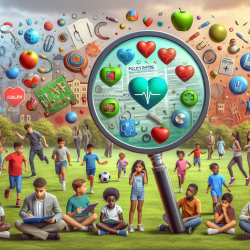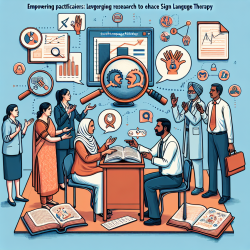Understanding the Impact of State-Level Immigrant Policies on Children's Health
As a speech-language pathologist, your primary goal is to ensure the best possible outcomes for the children you work with. But did you know that state-level policies could significantly impact the health of the children you serve? A recent study titled "Self-rated health of both US citizens and noncitizens is associated with state-level immigrant criminalization policies" provides valuable insights into how these policies can affect health outcomes, particularly for children from immigrant families.
The Study: Key Findings
The research conducted by Young, Crookes, and Torres (2022) explored the relationship between state-level immigrant criminalization policies and self-rated health (SRH) among US citizens and noncitizens. The study utilized data from the 2014-2015 National Health Interview Survey, encompassing a diverse sample of 70,335 individuals, including Latinos and Asian and Pacific Islanders (APIs).
Key findings from the study include:
- States with more restrictive immigrant policies are associated with health disparities between citizens and noncitizens.
- These policies negatively impact self-rated health for US-born citizens, not just noncitizens.
- The impact is consistent across different racial and ethnic groups, including Latinos and APIs.
Implications for Practitioners
As practitioners, understanding the broader social and policy context is crucial for supporting children's health and development. Here are some ways you can apply these findings to your practice:
- Advocate for Policy Change: Use your voice and expertise to advocate for more inclusive policies that support the health and well-being of all children, regardless of citizenship status.
- Increase Awareness: Educate parents and community members about the potential impact of state policies on health outcomes and encourage them to engage in advocacy efforts.
- Support Mixed-Status Families: Recognize the unique challenges faced by mixed-status families and provide targeted support and resources to help them navigate these challenges.
- Collaborate with Other Professionals: Work with other healthcare and education professionals to address the broader determinants of health and advocate for systemic change.
Encouraging Further Research
While this study provides valuable insights, there is still much to learn about the impact of state policies on health outcomes. As practitioners, you can contribute to this body of knowledge by engaging in research and data collection efforts. Consider collaborating with researchers to explore the specific impacts of policies on the children you serve and share your findings with the broader community.
Conclusion
Understanding the impact of state-level policies on health outcomes is crucial for speech-language pathologists and other practitioners working with children. By staying informed and engaged, you can help advocate for policies that promote health equity and improve outcomes for all children.
To read the original research paper, please follow this link: Self-rated health of both US citizens and noncitizens is associated with state-level immigrant criminalization policies.










